The University of Barcelona has its own workspace in the field of development cooperation which includes actions in the field of general training, specialised training, research applied to development, research cooperation with southern countries, etc.
Within this framework, UB Solidarity Foundation carries out development cooperation projects in different regions of the world, giving priority to inter-university cooperation. Among the main lines of work are projects dedicated to human rights, the environment and water, which are essential strategic sectors for a sustainable development at the environmental, social and political levels.
PALESTINE: Agricultural innovation, climate change and peasant rights in Palestine through women’s cooperatives and the international alliance between universities
Period: 2024 – 2025
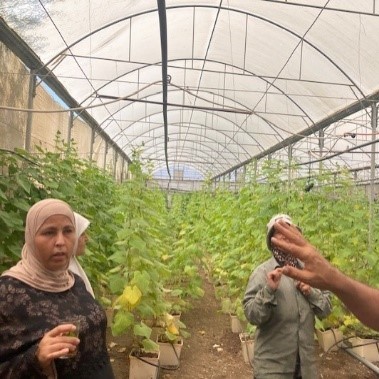 Joint project with the Catalan Association for Peace (ACP) that seeks to provide training to cooperatives of women farmers of the Palestinian Farmers Union (PFU) in the field of hydroponic crops and advanced control systems, to improve the use of water, in the framework of the fight against climate change. Likewise, it plans to launch these advanced control systems in the experimental farm (with hydroponic crops) promoted in a previous project at the Palestinian Technical University Kadoorie in Tulkarem (West Bank). With the support of the Spanish Agency for International Development Cooperation (AECID).
Joint project with the Catalan Association for Peace (ACP) that seeks to provide training to cooperatives of women farmers of the Palestinian Farmers Union (PFU) in the field of hydroponic crops and advanced control systems, to improve the use of water, in the framework of the fight against climate change. Likewise, it plans to launch these advanced control systems in the experimental farm (with hydroponic crops) promoted in a previous project at the Palestinian Technical University Kadoorie in Tulkarem (West Bank). With the support of the Spanish Agency for International Development Cooperation (AECID).
This project is related to the following ODS of the Agenda 2030:
- SDG 5. Gender equality
-
SDG 6. Clean water and sanitation
Target 6.4: By 2030, substantially increase water-use efficiency across all sectors and ensure sustainable withdrawals and supply of freshwater to address water scarcity and substantially reduce the number of people suffering from water scarcity. Target 6.a: By 2030, expand international cooperation and capacity-building support to developing countries in water- and sanitation-related activities and programmes, including water harvesting, desalination, water efficiency, wastewater treatment, recycling and reuse technologies.
-
SDG 13. Climate action
Target 13.1: Strengthen resilience and adaptive capacity to climate-related hazards and natural disasters in all countries. Target 13.b: Promote mechanisms for raising capacity for effective climate change-related planning and management in least developed countries and small island developing States, including focusing on women, youth and local and marginalized communities.
-
SDG 17. Partnerships for the goals
Target 17.16: Enhance the global partnership for sustainable development, complemented by multi-stakeholder partnerships that mobilize and share knowledge, expertise, technology and financial resources, to support the achievement of the sustainable development goals in all countries, in particular developing countries.
SENEGAL: Good governance and citizen participation for a sustainable city in Richard Toll
Period: 2023 – 2025
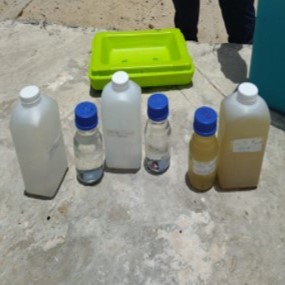

This project is related to the following ODS of the Agenda 2030:
TUNISIA: Momkin – Youth and creativity for peace and the prevention of violent conflicts in the Maghreb
Period: 2023 – 2025
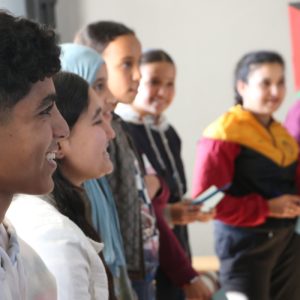

This project is related to the following ODS of the Agenda 2030:
CAMBODIA, LAOS AND VIETNAM: Inow Asia
Period: 2021 – 2024
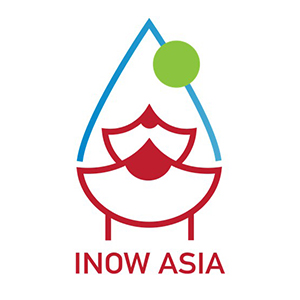

Project for the development of innovative multilevel formation programs for the new water leading professionals in Southeast Asia. With the support of the European Union, through the Erasmus+ program.
For more information, please click here.
This project is related to the following ODS of the Agenda 2030:
- SDG 4. Quality education
-
SDG 6. Clean water and sanitation
Target 6.4: By 2030, substantially increase water-use efficiency across all sectors and ensure sustainable withdrawals and supply of freshwater.
Target 6.a: By 2030, expand international cooperation and capacity-building support to developing countries in water- and sanitation-related activities and programmes, including water harvesting, desalination, water efficiency, wastewater treatment, recycling and reuse technologies.
-
SDG 17. Partnerships for the goals
Target 17.16: Enhance the global partnership for sustainable development, complemented by multi-stakeholder partnerships that mobilize and share knowledge, expertise, technology and financial resources, to support the achievement of the sustainable development goals in all countries, in particular developing countries.
PALESTINE: Empowerment, incidence, innovation and fight against climate change of cooperatives of Palestinian women
Period: 2021 – 2023
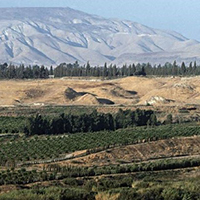

For more information, please click here.
This project is related to the following ODS of the Agenda 2030:
- SDG 5. Gender equality
-
SDG 6. Clean water and sanitation
Target 6.4: By 2030, substantially increase water-use efficiency across all sectors and ensure sustainable withdrawals and supply of freshwater to address water scarcity and substantially reduce the number of people suffering from water scarcity. Target 6.a: By 2030, expand international cooperation and capacity-building support to developing countries in water- and sanitation-related activities and programmes, including water harvesting, desalination, water efficiency, wastewater treatment, recycling and reuse technologies.
-
SDG 13. Climate action
Target 13.1: Strengthen resilience and adaptive capacity to climate-related hazards and natural disasters in all countries. Target 13.b: Promote mechanisms for raising capacity for effective climate change-related planning and management in least developed countries and small island developing States, including focusing on women, youth and local and marginalized communities.
-
SDG 17. Partnerships for the goals
Target 17.16: Enhance the global partnership for sustainable development, complemented by multi-stakeholder partnerships that mobilize and share knowledge, expertise, technology and financial resources, to support the achievement of the sustainable development goals in all countries, in particular developing countries.
TUNISIA: Wahda – Exchange of good practice experiences on physical activity as a tool for social resistance and social cohesion
Period: 2020 – 2022
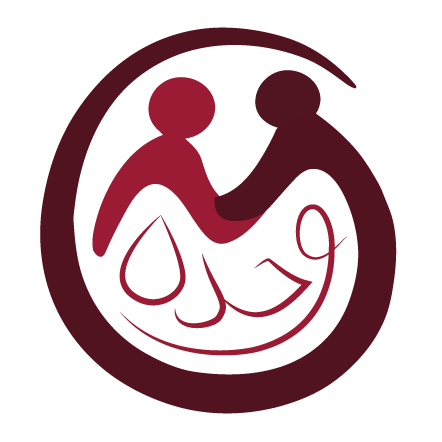 Project that aims to strengthen the role of Tunisian civil society (especially, women and youth) for the defense of civic space through the protection of civil and political rights and the promotion of social cohesion. Wahda is coordinated by NOVACT and, in addition to UB Solidarity Foundation, other partner entities are the University of Carthage (UCAR) and the Tunisian League for the Defense of Human Rights (LTDH). The Tunisian association ADO+ and the Catalan associations Superacció and la Rotllana are also taking part. With the support of the Catalan Agency for Development Cooperation (ACCD).
Project that aims to strengthen the role of Tunisian civil society (especially, women and youth) for the defense of civic space through the protection of civil and political rights and the promotion of social cohesion. Wahda is coordinated by NOVACT and, in addition to UB Solidarity Foundation, other partner entities are the University of Carthage (UCAR) and the Tunisian League for the Defense of Human Rights (LTDH). The Tunisian association ADO+ and the Catalan associations Superacció and la Rotllana are also taking part. With the support of the Catalan Agency for Development Cooperation (ACCD).
For more information, please click here.
This project is related to the following ODS of the Agenda 2030:
COLOMBIA: Implementation of the Peace Accords in Colombia. For a real, stable and lasting peace
Period: 2020 – 2021
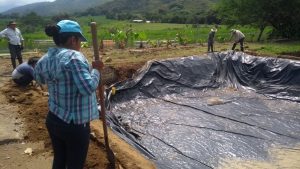

Joint project with the Catalan Association for Peace (ACP) and the Institute for Intercultural Studies (IEI) of the Pontificia Universidad Javeriana de Cali (PUJ). With the support of the Catalan Agency for Development Cooperation (ACCD).
This project is related to the following ODS of the Agenda 2030:
-
SDG 1. No poverty
Target 1.4: By 2030, ensure that all men and women, in particular the poor and the vulnerable, have equal rights to economic resources, as well as access to basic services, ownership and control over land and other forms of property, inheritance, natural resources, appropriate new technology and financial services, including microfinance
-
SDG 5. Gender equality
Target 5.1: End all forms of discrimination against all women and girls everywhere.
Target 5.2: Eliminate all forms of violence against all women and girls in the public and private spheres, including trafficking and sexual and other types of exploitation.
Target 5.4: Recognize and value unpaid care and domestic work through the provision of public services, infrastructure and social protection policies and the promotion of shared responsibility within the household and the family as nationally appropriate.
Target 5.5: Ensure women’s full and effective participation and equal opportunities for leadership at all levels of decisionmaking in political, economic and public life.
-
SDG 8. Decent work and economic growth
Target 8.2: Achieve higher levels of economic productivity through diversification, technological upgrading and innovation, including through a focus on high-value added and labour-intensive sectors. Target 8.3: Promote development-oriented policies that support productive activities, decent job creation, entrepreneurship, creativity and innovation, and encourage the formalization and growth of micro-, small- and medium-sized enterprises, including through access to financial services. Target 8.5: By 2030, achieve full and productive employment and decent work for all women and men, including for young people and persons with disabilities, and equal pay for work of equal value.
-
SDG 10. Reduced inequalities
Target 10.2: By 2030, empower and promote the social, economic and political inclusion of all, irrespective of age, sex, disability, race, ethnicity, origin, religion or economic or other status.
Target 10.3: Ensure equal opportunity and reduce inequalities of outcome, including by eliminating discriminatory laws, policies and practices and promoting appropriate legislation, policies and action in this regard.
-
SDG 12. Responsible production and consumption
Target 12.2: By 2030, achieve the sustainable management and efficient use of natural resources.
Target 12.3: By 2030, halve per capita global food waste at the retail and consumer levels and reduce food losses along production and supply chains, including post-harvest losses.
Target 12.5: By 2030, substantially reduce waste generation through prevention, reduction, recycling and reuse.
-
SDG 16. Peace, justice and strong institutions
Target 16.3: Promote the rule of law at the national and international levels and ensure equal access to justice for all. Target 16.7: Ensure responsive, inclusive, participatory and representative decision-making at all levels. Target 16.10: Ensure public access to information and protect fundamental freedoms, in accordance with national legislation and international agreements. Target 16.a: Strengthen relevant national institutions, including through international cooperation, for building capacity at all levels, in particular in developing countries, to prevent violence and combat terrorism and crime.
SENEGAL: Support to the sustainable management of Saint Louis’ water resources (phase II)
Period: 2019 – 2021
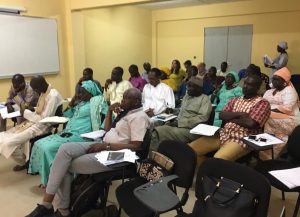 Project that gives continuity to the initiative “Support to the sustainable management of Saint Louis’ water resources (Senegal)” (2016-2018). It affects the water and sanitation rights of the peri-urban areas of the Senegalese city of Saint Louis by strengthening the capacities of the holders of responsibilities and promoting innovative and ecological models of water management and sanitation through of schools. In collaboration with Gaston Berger University (UGB) and the Món-3 foundation, and with the support of Barcelona City Council.
Project that gives continuity to the initiative “Support to the sustainable management of Saint Louis’ water resources (Senegal)” (2016-2018). It affects the water and sanitation rights of the peri-urban areas of the Senegalese city of Saint Louis by strengthening the capacities of the holders of responsibilities and promoting innovative and ecological models of water management and sanitation through of schools. In collaboration with Gaston Berger University (UGB) and the Món-3 foundation, and with the support of Barcelona City Council.
This project is related to the following ODS of the Agenda 2030:
SENEGAL: Natural technologies for a sustainable management of waste water
Period: 2017 – 2018 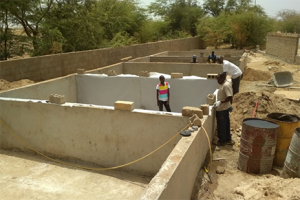
Project for the implementation of natural technologies for the sustainable management of waste water in rural and peri-urban areas of Senegal. With the support of the Spanish Agency for International Development Cooperation (AECID).
This project is related to the following ODS of the Agenda 2030:
SENEGAL: Support to the sustainable management of Saint Louis’ water resources
Period: 2016 – 2018
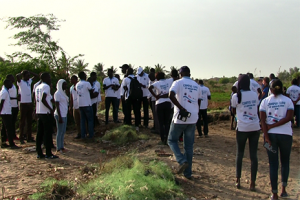 Knowledge transfer project for the development of low-cost, sustainable and environmentally friendly sanitation techniques. The overall objective of the project is to contribute to the promotion of a sustainable management of water resources in the Saint Louis region of Senegal, in order to improve the quality of life and well-being of the population. The specific objective of the project is to promote sustainable and ecological solutions for the management of waste water as well as to improve the capacity of local institutions to manage sanitation services. With the support of Barcelona City Council and the Barcelona Metropolitan Area.
Knowledge transfer project for the development of low-cost, sustainable and environmentally friendly sanitation techniques. The overall objective of the project is to contribute to the promotion of a sustainable management of water resources in the Saint Louis region of Senegal, in order to improve the quality of life and well-being of the population. The specific objective of the project is to promote sustainable and ecological solutions for the management of waste water as well as to improve the capacity of local institutions to manage sanitation services. With the support of Barcelona City Council and the Barcelona Metropolitan Area.
This project is related to the following ODS of the Agenda 2030:
COLOMBIA: Creation of the centre for a comprehensive education for young people of the “Indigenous protection La María”
Period: 2011 – 2013 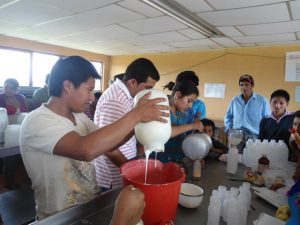

The objective of this project is to improve the socio-economic conditions of the indigenous communities and to recover the ancestral traditions in cattle raising, dairy production and manufacture of derived dairy products (yoghurt, cheese, butter). This is done to avoid the enlistment of young people to armed groups and the loss of their own cultural values, which are two of the consequences of the structural poverty.
This project is related to the following ODS of the Agenda 2030:
- ODS 1. No poverty
- ODS 8. Decent work and economic growth
- ODS 11. Sustainable cities and communities
-
ODS 12. Responsible consumption and production
Target 12.8: By 2030, ensure that people everywhere have the relevant information and awareness for sustainable development and lifestyles in harmony with nature. Target 12.a: Support developing countries to strengthen their scientific and technological capacity to move towards more sustainable patterns of consumption and production.
VIETNAM: Treatment of industrial waste water in the provinces of Quang Ninh and Hanoi
Period: 2010 – 2013 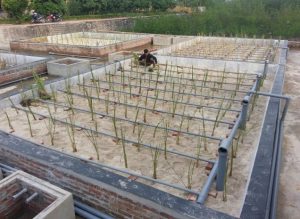

Financed by the Spanish Agency for International Development Cooperation (AECID) and jointly with the National University of Vietnam, a waste water treatment facility has been set up in a seafood manufacturing industry in Halong Bay, which is an environment declared a UNESCO World Heritage Site (1994). The facility works with ecological systems and is the first infrastructure of its kind in Southeast Asia registered in the world register of constructed wetlands (Wetlands). The project has also included activities related to environmental awareness in urban and peri-urban areas of the provinces involved.
This project is related to the following ODS of the Agenda 2030:
COLOMBIA: Inter-University Cooperation Program between the University of Barcelona and the Javeriana University of Cali
Period: 2008 – 2012 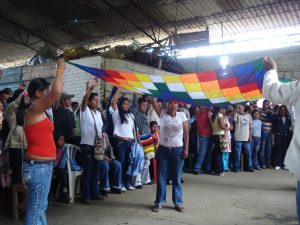

The program aims to give voice and empowerment to the invisible victims of the armed conflict in Colombia (essentially, indigenous and Afro-descendant communities, women and peasants) so that they can act as fundamental agents of the peace process. With the support of the Spanish Agency for International Development Cooperation (AECID), this program offers three basic lines of action: indigenous rights and the defence of human rights; peace actions led by women, and the creation of the Institute for Intercultural Studies at the south west of Colombia.
This project is related to the following ODS of the Agenda 2030:
- SDG 5. Gender equality
- SDG 11. Sustainable cities and communities
-
SDG 16. Peace, justice and strong institutions
Target 16.7: Ensure responsive, inclusive, participatory and representative decision-making at all levels. Target 16.a: Strengthen relevant national institutions, including through international cooperation, for building capacity at all levels, in particular in developing countries, to prevent violence and combat terrorism and crime.
MASTER’S DEGREE IN GLOBALISATION, DEVELOPMENT AND COOPERATION
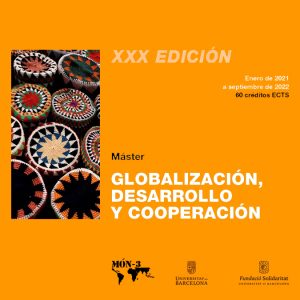

For more information, please click here.
This project is related to the following ODS of the Agenda 2030:
-
ODS 4. Quality education
Target 4.7: By 2030, ensure that all learners acquire the knowledge and skills needed to promote sustainable development, including, among others, through education for sustainable development and sustainable lifestyles, human rights, gender equality, promotion of a culture of peace and non-violence, global citizenship and appreciation of cultural diversity and of culture’s contribution to sustainable development.
















